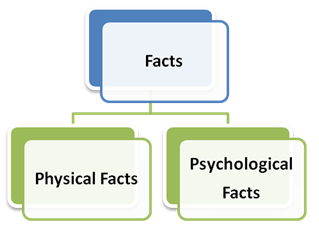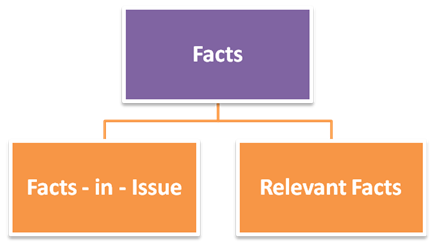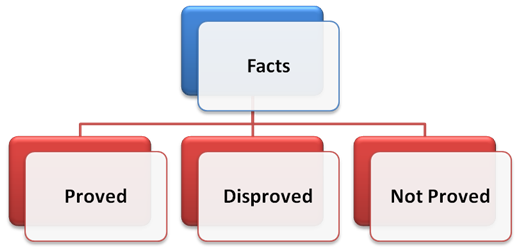A fact is something that has already beendone or an action in process. It is an event that has definitely and actually taken place, and is distinguishable from a suspicion, innuendo, or supposition
Afact is a truth as opposed to fiction or mistake.
Fact plays an important role in Evidence law because all rights and liabilities depend upon facts and also originate from it. Generally, fact means anything which is in existence. But under Evidence Act, the meaning of the word is not limited to only what is tangible and visible or, is in any way, the object of senses.

According to Section 3 of The Indian Evidence Act, 1872 Fact means and includes :
Physical Facts –
- Any thing, state of things or relation of things capable of being perceived by the senses. In other words, all facts which are subject to the perception by bodily senses are physical facts
Illustrations :
- (a) That there are certain objects arranged in a certain order in a certain place, is a fact.
- (b) That a man heard or saw something, is a fact.
- (c) That a man said certain words, is a fact.
According to Section 3 of The Indian Evidence Act, 1872 Fact means and includes :
Psychological Facts –
- Any mental condition of which any person is conscious and cannot perceived by senses . Examples- Intention (Mens Rea) knowledge, good faith, fraud etc.
Illustrations :
- A person has an intention to commit murder.
- That a man has a certain reputation, is a fact.
According to Section 3 of The Indian Evidence Act, 1872 Fact means and includes :
Physical facts can be proved by Oral or Documentary Evidence of any person whereas mental facts may be proved by circumstantial evidence.
Illustration-
A attacks B with a sword. Attacking with sword is a physical fact which can be proved by the oral evidence of a person who has seen it. But as to the question of intention of A, it is a mental element which can only be proved by his confession or circumstantial evidence.
According to Section 3 of The Indian Evidence Act, 1872 Fact means and includes :

According to Section 3 of The Indian Evidence Act, 1872 Fact means and includes :
Facts in Issue –
Facts in issue are the central contentions upon which a dispute is centered. They are the crux of the argument, the focal point of the dispute.
A fact in issue is that fact, which fundamentally affects the dispute before the court
Every proceeding, whether criminal or civil, is a dispute. This is because they both involve one party claiming some thing and the other party saying some or all of those things are not true.
The fact in issue is also known by its Latin name ‘Factum Probandum‘ or that which is to be proved.
One party asserts his rights and asserts the liability of the opposite party
The opposite party on the other hand will deny that right and deny his liability.
The allegations alleged in the charge sheet in criminal matters are known as Fact in Issue.
What Determines A Fact In Issue?
The facts in issue in any proceeding are determined by two major factors. These are:
The law that regulates that particular dispute i.e. the substantive law (ex – IPC)
The primary court processes of the parties i.e. pleadings, in civil proceedings and the charge, in criminal proceedings.
The Substantive Law
The substantive law is usually the particular area of law upon which the dispute is founded. For instance, where the dispute is criminal in nature and centered on Murder, the substantive law would be the applicable code that provides for the offence of Murder.
Those things/ingredients which constitute the offence of Murder are expected to be proved and where the prosecutor fails to prove them, he can consider his case lost.
‘A’ is accused of the murder of ‘B’.
At his trial the following facts may be in issue:—
That A caused B’s death;
That A intended to cause B’s death;
That A at the time of doing the act which caused B’s death, was, by reason of unsoundness of mind, incapable of knowing its nature.
In civil cases though, the fact in issue is whatever is claimed by one party and controverted by the other. Once a party claims a fact and the other accepts or fails to controvert it, such fact is no more in issue.
Relevant Fact
According to Stephen-‘Whenever two facts, to which it applies, are so related to each other that in order of natural course of events either by itself or with other facts, proves or makes probable the existence or non-existence of past, present or future of other, is called Relevant.
As Per the Indian Evidence Act 1872,
“Relevant” – One fact is said to be relevant to another when the one is connected with the other in any of the ways referred to in the provisions of this Act relating to the relevancy of fact
Relevant Facts are also known as Facta Probantia
According to Janab’s Key to Evidence –
Relevancy refers to the degree of connection and probative value between a fact that is given in evidence and the issue to be proved.
As per law, relevant facts are those facts which are not disputed by themselves rather are so related to disputed facts that disputed facts become probable or improbable.
The test of relevance — that the evidence could rationally affect (directly or indirectly) the assessment of the existence of a fact in issue in the proceeding — directs attention to the capability rather than the weight of the evidence to perform that task.
Any fact is relevant if it can be used to prove or disprove a material issue in the case.
Facts relevant but not admissible
- Privileged Communication (S- 121 -130)
- Confession during Police Custody
- Hearsay statements
- Exclusion of Hearsay evidence
- Estoppel









No comment